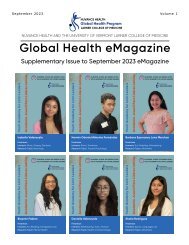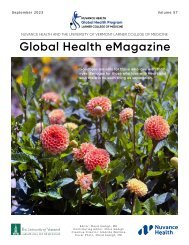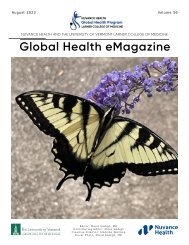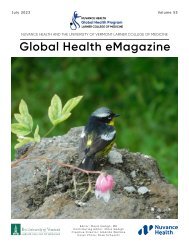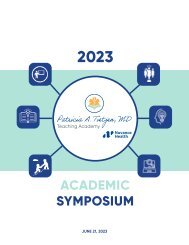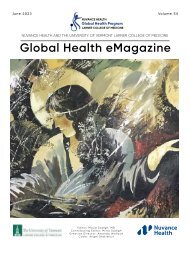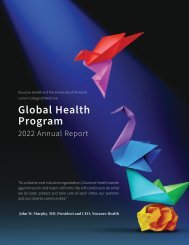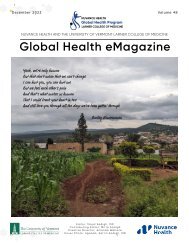eMagazine April 2023
You also want an ePaper? Increase the reach of your titles
YUMPU automatically turns print PDFs into web optimized ePapers that Google loves.
OUR PEOPLE,<br />
OUR MISSION<br />
Global Health<br />
<strong>eMagazine</strong><br />
<strong>April</strong> <strong>2023</strong><br />
Perspectives<br />
Reports from the Field<br />
Highlights<br />
Reflections<br />
Nursing Division<br />
Women’s Health Education<br />
Hispanic/Latinx Community<br />
Ugandan Voices<br />
Innovation and Technology<br />
Our Beautiful Planet<br />
Art to Remind Us of<br />
Who We Can Be<br />
Video of the Month<br />
Announcement<br />
New Publications<br />
Article of the Month<br />
Welcome<br />
Among the Letters<br />
Congratulations<br />
Photo News<br />
Calendar<br />
Global Health Family<br />
Resources<br />
Previous Issues of<br />
the <strong>eMagazine</strong><br />
Innovation and Technology<br />
in Global Health<br />
Written by Swapnil Parve, MD<br />
Director of International Affairs at the NH/<br />
UVMLCOM Global Health Program<br />
Over the past several years, we have seen a wave of emerging technologies,<br />
from blockchain and Unmanned Aerial Vehicles (UAVs) to artificial intelligence (AI),<br />
demonstrate significant potential to alter and disrupt multiple sectors, including<br />
healthcare. Recognizing the huge potential of AI in global health, The Rockefeller<br />
Foundation and United States Agency for International Development’s (USAID)<br />
Center for Innovation and Impact (CII) have partnered, in close coordination with<br />
the Bill and Melinda Gates Foundation, to develop AI in Global Health: Defining<br />
a Collective Path Forward. This report identifies opportunities for donors,<br />
governments, investors, the private sector, and other stakeholders to explore<br />
and accelerate the appropriate development and cost-effective use of AI at<br />
scale in global health.<br />
AI in Global Health:<br />
Section Editor: Swapnil Parve, MD<br />
Artificial Intelligence in Global Health:<br />
Defining a Collective Path Forward<br />
• Explores the current state of the art of AI in healthcare to determine use<br />
cases with the highest potential in the global health context<br />
• Assesses the most critical challenges to scaling AI in low and middle<br />
income countries to understand which barriers may require more strategic<br />
and deliberate intervention<br />
• Explores potential investments as part of a coordinated approach to<br />
funding this space effectively<br />
Artificial intelligence (AI) has begun to create change in healthcare across<br />
developed markets, and has potential to drive game-changing improvements<br />
for underserved communities in global health. From enabling community-health<br />
workers to better serve patients in remote areas to helping governments in<br />
low and middle-income countries (LMICs) prevent deadly disease outbreaks<br />
before they occur, there is growing recognition of the tremendous potential<br />
of AI tools to break fundamental tradeoffs in health access, quality, and cost.<br />
Health systems in LMICs face obstacles including daunting shortages of workers,<br />
medical equipment, and other resources that require strategic and innovative<br />
approaches to overcome. AI tools have exciting potential not only to optimize<br />
existing resources and help overcome these workforce resource shortages, but<br />
also to greatly improve healthcare delivery and outcomes in low-income settings<br />
in ways never previously imagined.<br />
Link to the Article: AI in Global Health<br />
21




